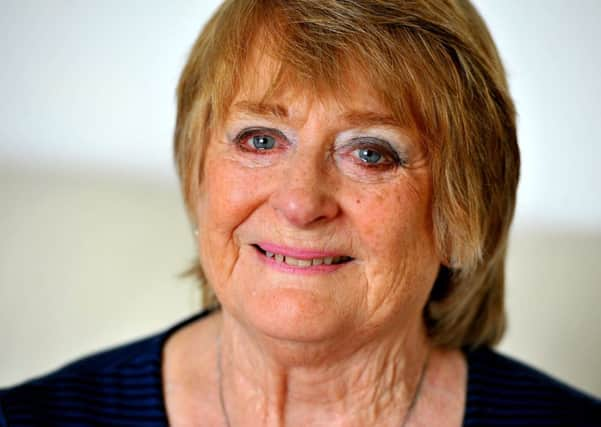Gloria remembers VE Day 70 years later


One of them, Gloria Carpenter, then aged seven, caught the first train from Worthing to the capital with her mum and nanna.
The family, all dressed in red, white and blue, made its way to Buckingham Palace and found a spot near to the Victoria Memorial.
Advertisement
Hide AdAdvertisement
Hide AdRecalling the momentous occasion, Gloria, of Brighton Road, Worthing, said: “Many thousands of people had camped out all night, under rugs, umbrellas, and anything that could shelter them from the cold night air.
Already, as dawn was breaking, more and more people were arriving, by charabanc, taxis, bicycles, any form of transport they could find.
“By 10am, the whole area was a huge and exultant sea of humanity, so excited and ready to party.
“This very special day in our history had been declared a public holiday.”
Advertisement
Hide AdAdvertisement
Hide AdBuoyed by the atmosphere, strangers shared flasks of tea and asked each other questions such as ‘Where have you travelled from?’ and ‘How did you get here?’.
According to Gloria, one young sailor waded through the fountain water and tried to climb to the top. He reached the plinth above Queen Victoria’s head and sat waving. Soon, other intrepid revellers joined him, much to the delight of everyone else.
She said: “An RAF man came up to my beautiful mum, swung her round, and kissed her enthusiastically.
“He didn’t even know her. She didn’t seem to mind one bit, in fact I thought she quite liked it. I was astonished, so was Nanna.
Advertisement
Hide AdAdvertisement
Hide Ad“I remember a soldier standing on the roof of a taxi tearing up his ration book. My Mum said, ‘I hope he doesn’t regret it, it’s a bit too early for that’. He probably did, for it was to be a long time before we could shop without rationing and coupons.”
The huge crowd had waited eagerly to be addressed by King George VI and Queen Elizabeth. Their arrival was greeted by cheers from the audience and a rendition of the national anthem. Gloria said people were laughing and crying at the same time.
Princess Elizabeth followed, dressed in her Auxiliary Territorial Service (ATS) uniform, then Princess Margaret, to more cheers.
Gloria remembered the crowd singing Vera Lynn’s ‘There’ll be Bluebirds Over the White cliffs of Dover’, ‘Pack up Your Troubles’, ‘Run Rabbit Run’ and many more.
Advertisement
Hide AdAdvertisement
Hide AdAs word got out that prime minister Winston Churchill was inside the palace, the crowd chanted ‘We want Winnie’.
“Eventually, he appeared on the balcony complete with his famous cigar,” said Gloria. “He had a dark jacket on, with a bow tie.
“He held both hands up in greeting, then made his famous V sign. The immense crowd went wild with delight.
“The dark days were over. No more fearing the knock on the door, and the dreaded telegram, informing of a loved one’s death.
Advertisement
Hide AdAdvertisement
Hide Ad“No more, the fearful wailing of the sirens, precipitating the scramble down to the shelters, and no more the terrifying whine of the bombs as they plummeted down to shatter, maim and destroy.
“Peace had come at last to Europe.
“Everything was going to be all right now.”
The streets were alight with lanterns and decorated with thousands of flags and bunting as the family left London during the night.
People danced around bonfires and music blared out from street parties.
Gloria said: “Some had even dragged their pianos out into the road.
Advertisement
Hide AdAdvertisement
Hide Ad“It was so strange after the inky dark of the blackout restrictions, and the wardens knocking on the doors if there was a tiny chink of light showing.
“Many people would still be celebrating when the next dawn broke.”
“No wonder they whooped with joy at the sight of Winston Churchill as he stood on the palace balcony that May day.
“He had said in his famous speech of June 4th 1940, ‘We will never surrender’ – and we never did.”